Our camping pack list (now available in PDF format) has everything you need for an awesome camping trip!
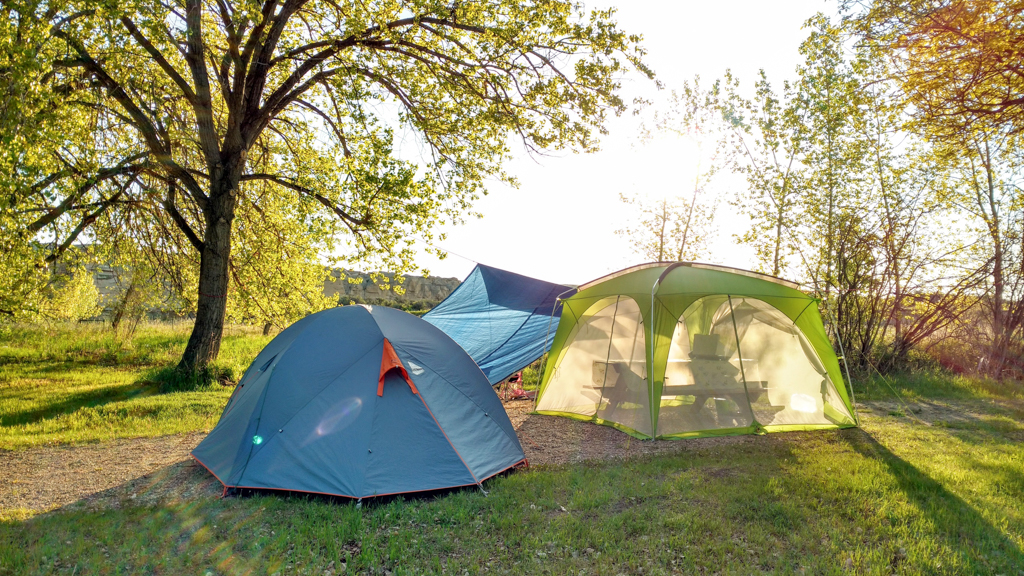
The size of your vehicle, number of passengers, and activities you want to do will determine what you can and can’t bring on a camping trip. If you have a smaller vehicle, prioritizing essentials, consumables, and luxuries will help with packing. What can you do without? What can you buy along the way or at your destination? My downfall is packing half the pantry when it would be easier to buy groceries in a few days. Our pack list is broken into several categories with essentials at the beginning and nice-to-haves at the end to make it easier to prioritize what comes with you.
Before kids, our epic road trips were done in a 1995 Honda Civic hatchback. Since it was just the two of us, and we had compact backpacking gear, we had plenty of room for everything we needed. Bikes or skis could go on the roof; everything else fit in the trunk and back seats. We got used to stooping to get into our backcountry tent, and cooking one small pot meals over an ultralight campstove.
When we had kids, we lost the back seat cargo space and needed more stuff… from a bigger tent and two-burner stove to travel cribs, toys, diapers, and clothes.. so many extra clothes (how do kids get so dirty?!)… so we needed a larger vehicle. We sprang for a small SUV; installed a hitch, bike rack, roof rack, and roof box; and were finally ready to travel in style. With this setup, we could go road tripping for weeks at a time.
Although we have TONS of camping experience (my first backcountry trip was at 6 weeks old!), we still rely on a camping pack list so we don’t forget anything. Scroll down for product recommendations, or download the PDF pack list here.
Disclosure: This post contains affiliate links through which I may earn a small commission at no extra cost to you, but all words and opinions are my own. Thank you for supporting our small family business!
Table of Contents
CAMPING PACK LIST: PDF + Gear Recommendations
DOWNLOAD THE CAMPING PACK LIST PDF BELOW:
1. Tent + Footprint
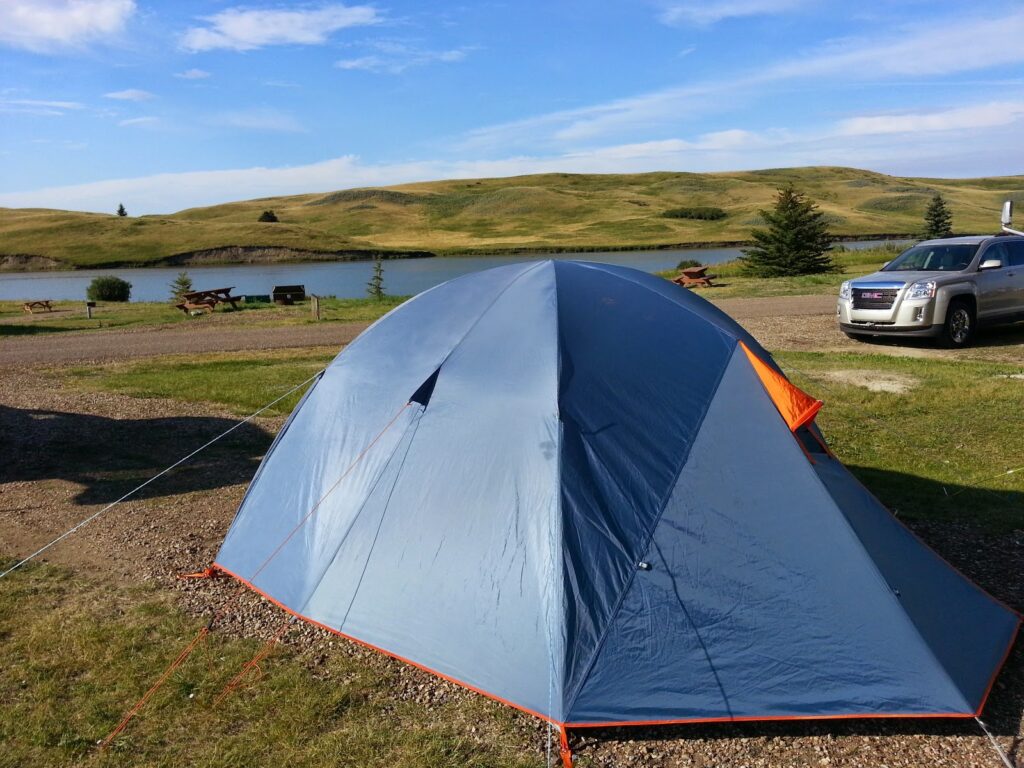
Get a tent with a reinforced “bathtub” floor, two doors, and fly that goes down to the ground (see photo above). You will also need a footprint/groundsheet that is the same size as your tent. As for size, the taller the tent, the less stable it will be in strong winds. While you won’t be standing up in your tent much except to get changed, large vestibules and doors will make it easier to get in and out (especially when it’s raining), so we recommend a midsized dome tent with large vestibules.
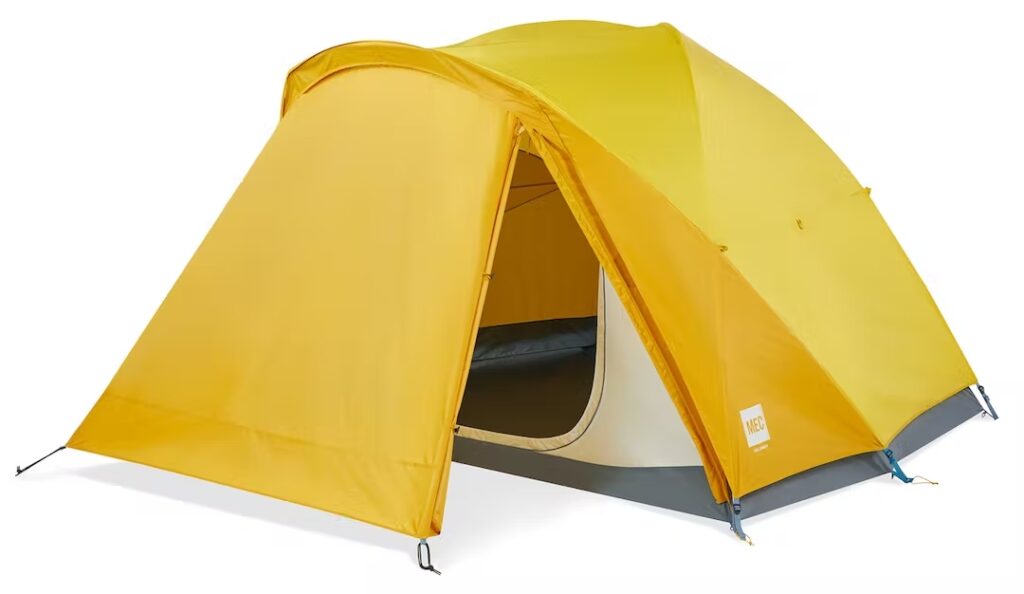
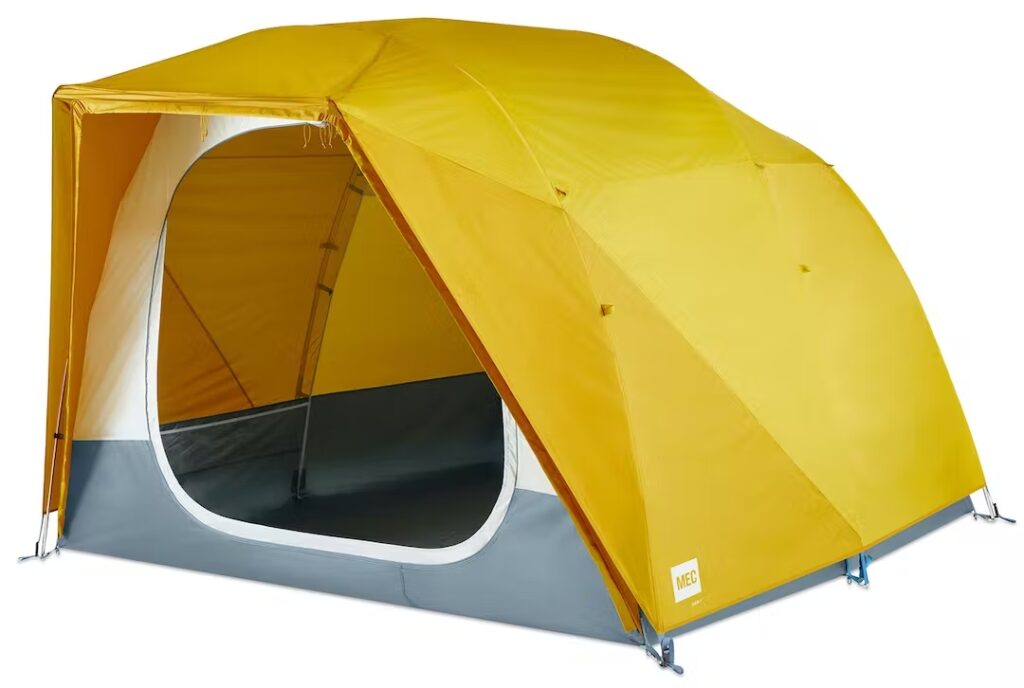
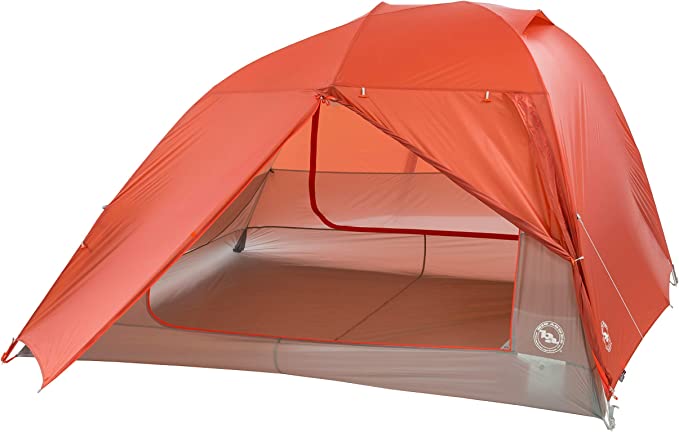
Recommended tents:
- The MEC Base Camper 4-Person Tent is a roomy, reliable tent that won’t break the bank, but it only has one-door.
- If you can afford to spend a bit more, the MEC Cabin 2.0 4-Person Tent will be much more comfortable/convenient with 2-doors, very spacious, lots of headroom, cord access for lights/phone charger/electric heater, and 8 internal storage pockets.
- For backcountry camping, we love our Big Agnes Copper Spur HV UL. The 3-person Copper Spur is only 4 pounds (1.8 kg)!
Pro Tip: Practice setting up your tent before your first trip, so you can set it up properly in any conditions. You will appreciate knowing how to set your tent up fast when it’s dark, a storm is rolling in, or you are being eaten alive by mosquitoes! Also, remember to peg the fly out and tighten guy lines to keep rain out. Even the most expensive tent will not keep you dry if you fail to peg the fly out.
For more information on getting the best tent for your budget, please read our story: Choosing a Tent.
2. Sleep System
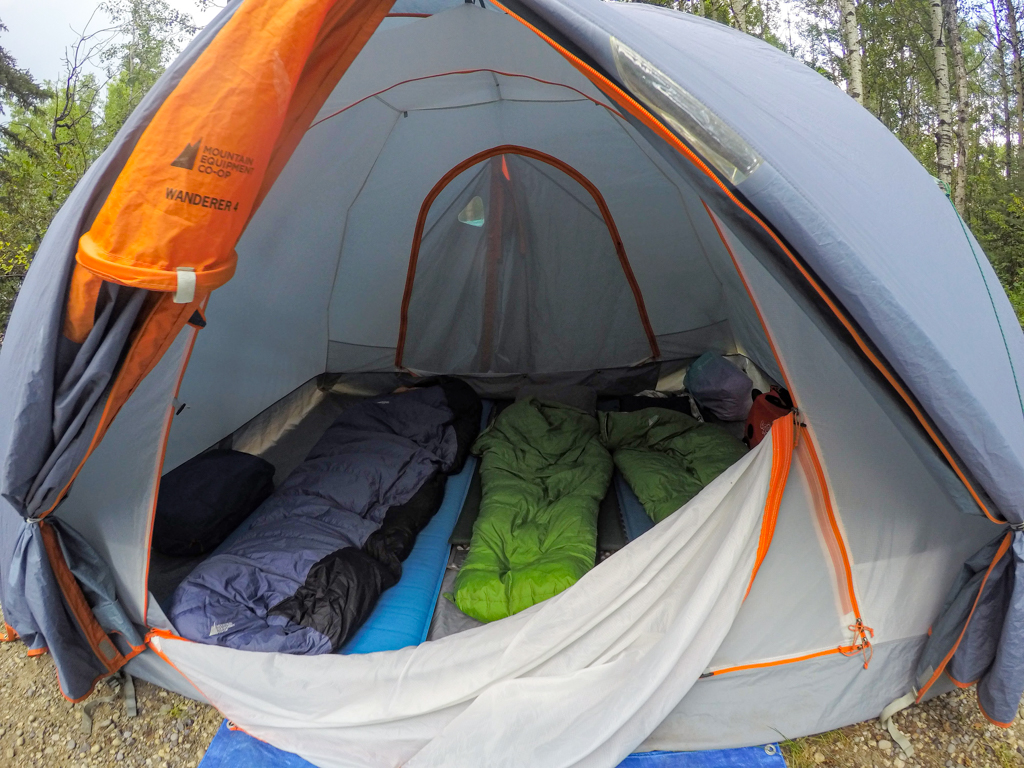
Most of the time, when I ask people why they don’t like camping, they say it’s because they don’t like sleeping on the cold, hard ground. There is no reason to be uncomfortable just because you are sleeping in a tent! There are several great options for camping bedding, and while some of them are costly, high quality sleeping pads / self-inflating mattresses / cots and sleeping bags will last for several years.
Sleeping Bags
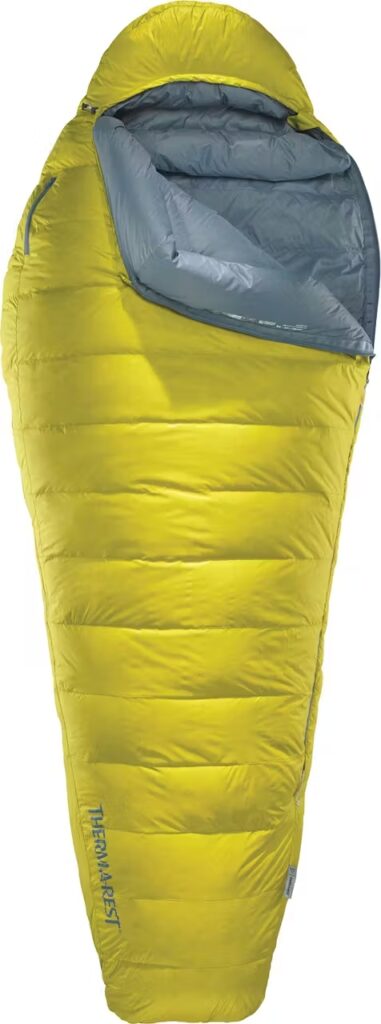
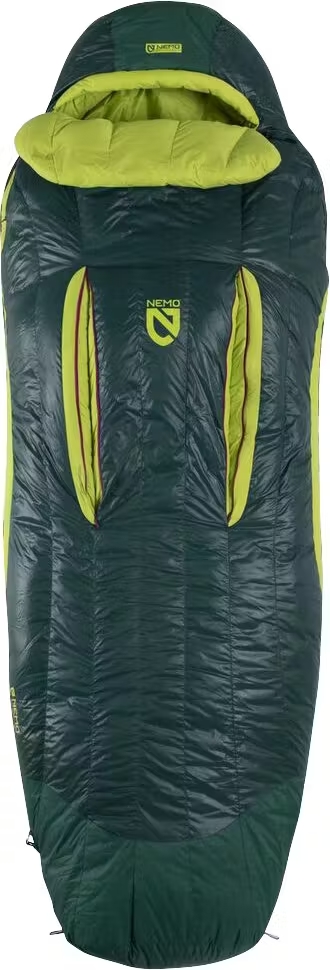
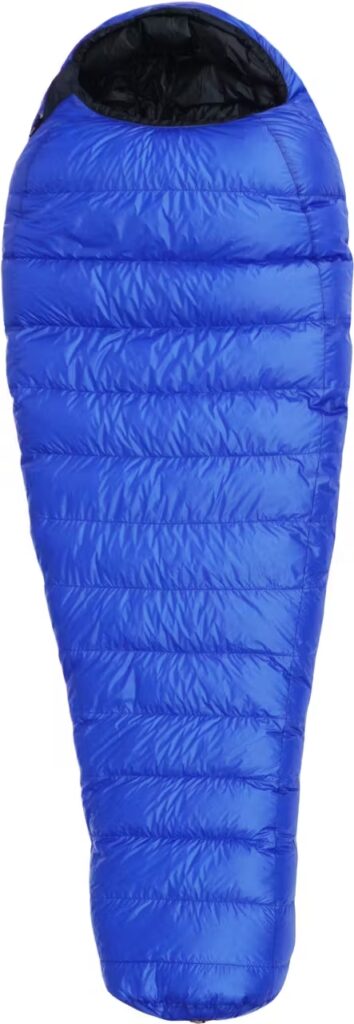
We recommend -7 C / -10 C down mummy bags, Therm-A-Rest self-inflating mattresses, and Therm-A-Rest pillows for camping in Alberta. If you camp in warmer climates, however, you may want a barrel bag for extra space, or 0C bag to save bulk and money. We recommend the following:
- TOP ALL ROUNDER: Therm-a-Rest Parsec -6C/20 F Down Sleeping Bag – Unisex features 800-fill hydrophobic down, high loft, zoned insulation (more on top), an insulated footbox, and light weight (light enough to take backcountry camping!) make this an attractive sleeping bag. It comes with removable straps to hold your sleeping pad in place too. The Small is only 720 grams and the Regular is 810 grams! Available in Small and Long lengths, and Regular and Large widths. Small fits to 5’6″ (168 cm), Regular fits to 6′ (183 cm) and Long fits to 6′ 6″ (198 cm).
- TOP WOMEN’S: Nemo Disco -9C / 15.8 F Down Sleeping Bag – Women’s has 650 fill hydrophobic down, vertical baffles to prevent cold spots, and a draft tube to keep cold air out, to keep you toasty warm all night. A unique blanket fold at the top allows you to adjust coverage for comfort so you don’t feel confined; and in case you get too warm, there are vents on the torso. There’s a zippered phone pocket so you can keep your phone warm (conserves battery life) too!) Small fits to 5′ 4″ (163 cm) and Regular fits to 5′ 10″ (178 cm). 1.4 kg.
- SPLURGE: Western Mountaineering Ultralite -7C Down Sleeping Bag: This incredibly light and compact sleeping bag, insulated with 850+ fill power down is perfect for backcountry or bikepacking trips but can also be used for frontcountry camping. The draft collar keeps cold air out and narrow profile allows you to warm up quickly. Tip: Use the sleeping bag with a silk liner so you don’t have to clean it as often. Small fits to 5′ 6″ (168 cm) and weighs 795g; Regular fits to 6′ 0″ (183 cm) and weights 820g (Regular Left Zip); Long fits to 6′ 6″ (198 cm) and weighs only 880g. The only downside is its pricetag.



- VALUE PICK: While not exactly a steal at $299, the MEC Delphinus -9C Women’s Down Sleeping Bag and MEC Draco -9C Men’s Down Sleeping Bag are a great value. You would be hard pressed to find a down bag this good for this price! For what it’s worth, I still use my MEC Raven -7 CDown Sleeping Bag that I purchased in 2004! Highlights include 650-fill power down, a water-resistant Pertex Quantum ripstop nylon shell, and vertical baffles over the torso to prevent cold spots.
- BEST LITTLE KIDS/YOUTH BAG FOR YOUR BUCK: MEC Draco Jr. -5C Down Sleeping Bag – Youths come in little kid and youth sizes. Top features include 650 fill-power down, water-resistant shell, and pad lock fits sleeping bag to sleeping pad. Small fits to 3′ 10″ (118 cm), Regular fits to 5′ 0″ (154 cm). The sleeping bag + stuff sack weighs about 1 kg. Note that the sleeping bag comes with a drawstring stuff sack, but you can make it smaller by packing it in an 8L compression stuff sack (not included)
Sleeping Mats/Pads


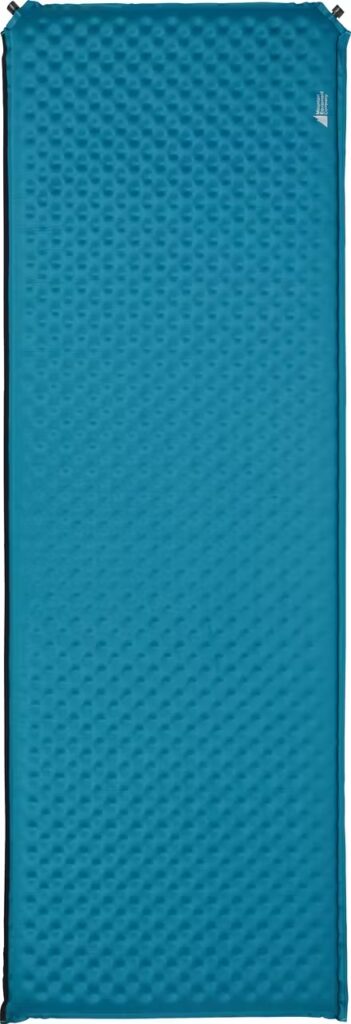

Sleeping pads cushion you from the hard ground and shield you from the cold ground. For three-season use, get a sleeping pad with an R-value (R= resistance to heat loss) of 3-4. If camping in cold weather/at high elevations, get an R-value of at least 5 (R 6.0 is good for -40 C/-40 F).
- The Sea to Summit Comfort Plus SI (Self Inflating) Sleeping Mat is the most comfortable sleeping mat I’ve ever tried (and I’ve tried a lot), and has an R-value of 5.1. It self-inflates super fast, and 3″ of “DeltaCore” foam keeps you super comfy, even if you’re a side sleeper. At 950 grams, the women’s Comfort Plus mat is a little heavy and bulky for backcountry camping, but awesome for frontcountry camping when cargo space is limited (saves me from packing a cot and sleeping pad). The one-way valve can be opened completely for fast self inflation, and closed when deflating to prevent air from coming back in. Available in Regular, Women’s, Large (Wide), Rectangular, and Double at Altitude Sports and MEC.
- Therm-a-Rest Neoair Xtherm NXT Sleeping Mat “offers the best warmth-to-weight ratio of any air sleeping pad construction.” This sleeping pad is a favorite of backcountry campers – and what I use – because it weighs only 0.44 kg (15.5 oz) and packs down to the size of a Nalgene bottle, but inflates to 3 inches (7.6 cm) thick and boasts a 7.3 R-value. Although the material is a bit crinkly, I don’t mind because the sleeping pad is so light and compact! Note that you need to blow this mat up or use the included pump sack, but it deflates almost instantly. If you’d prefer the rectangular version, go for the Therm-a-Rest NeoAir Xtherm NXT Max Sleeping Pad. Available at MEC and Altitude Sports.
- If weight is not an issue, try the more affordable MEC Reactor 6.5 Sleeping Pad – Unisex. With durable 150-denier ripstop polyester, 6.5 cm thickness for comfort, great insulation (5.0 R-Value), and rectangular shape with velcro side strips allow you to attach mats to make a double bed, the MEC Reactor 6.5 Sleeping Pad is ideal for car camping. Weight (Wide Long): 1.6 kg. Available in Wide Long, X-Large, and X-Long.
- For a lightweight, affordable option, try the MEC Reactor 3.8 Sleeping Pad – Unisex. 3.8 cm thick, 3.4 R-Value, Available in Short (153 cm) or Regular (183 cm, 730 grams).
Camp Pillows
If you have a mummy sleeping bag, you’ll need a smaller pillow. Look for a compressible one that you can bring backpacking. There are also hybrid (inflatable and compressible) pillows that are even more compact but more comfortable than an inflatable pillow.
- The Therm-a-Rest Compressible Cinch Pillow is super comfortable and size Medium (300 grams) fits perfectly inside a mummy sleeping bag. It packs down to about half its size.
- Save space and pack weight with the Sea To Summit Aeros Premium Deluxe Pillow. This hybrid foam/inflatable pillow weighs only 195 grams!
Learn more about camping sleep systems (sleeping bag + sleeping pad) and what baby should sleep in in our story: Camping Sleep Systems.
3. Clothes and Sleepwear
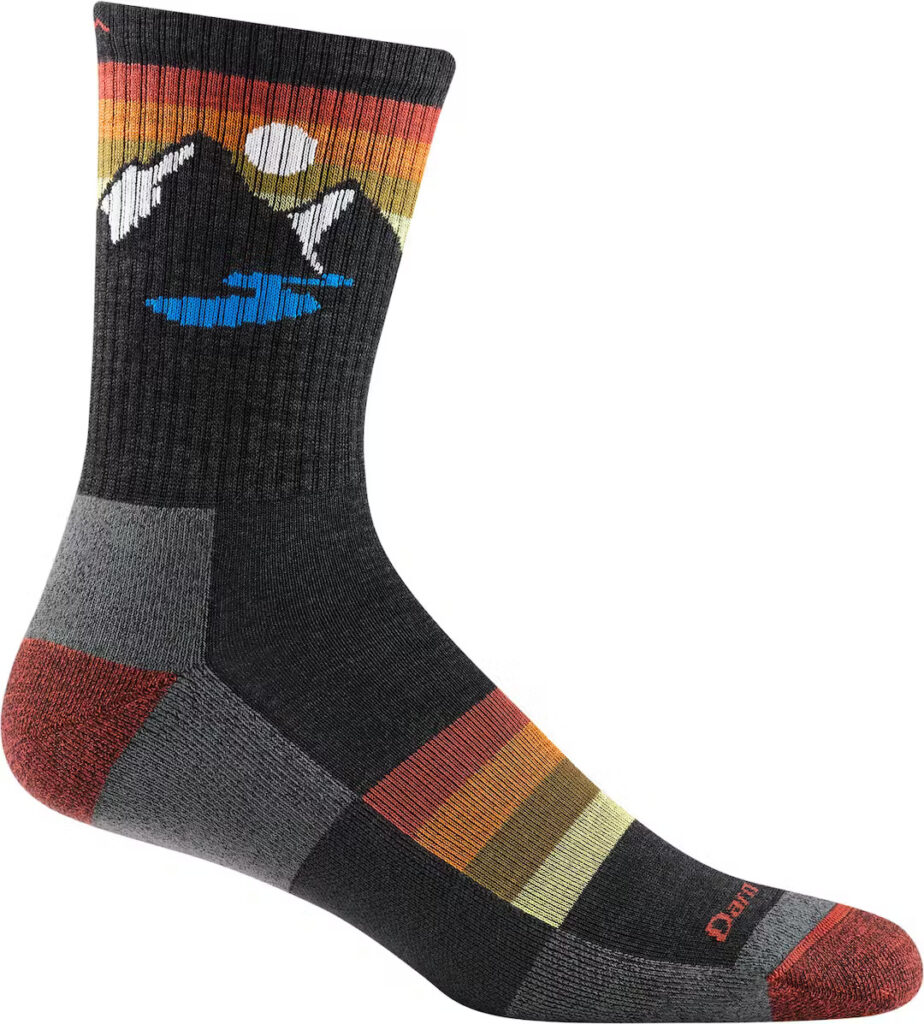
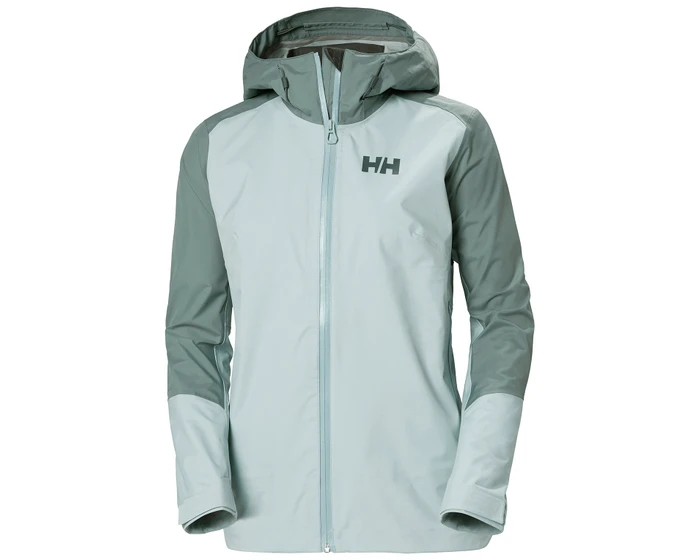
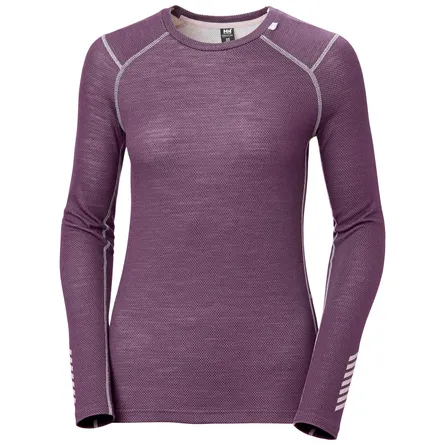
- Bring 1 pair of wool socks and underwear for each day of your trip, and clothes that mix and match and dry quickly. Don’t forget a midlayer (fleece or down sweater) and waterproof/windproof layer. I love my Helly Hansen Verglas 3L Shell; it is waterproof, breathable, has vents, taped seams, and an adjustable hood.
- Sleepwear: Bring a change of clothes, clean toque, socks, and liner gloves. Do not sleep in the clothes you wore during the day; for bear safety as well as comfort (clothes you hiked in all day might be sweaty and damp, making you feel cold!). Since it’s so chilly in the mountains at night, I usually sleep in Helly Hansen LIFA Merino base layers or microfleece long underwear.
- Baby sleepwear: Dress babies and toddlers in PJs and a fleece sleepsack or fleece bunting suit with fold-over mitts and booties. If necessary, put booties and mitts on baby’s hands and feet. Columbia and North Face also make quality fleece bunting suits.
4. Camp Kitchen
- Something to make coffee in: Collapsible silicone coffee dripper + coffee filters (size 1 or 2) are light and compact, the more expensive Aeropress Go Travel Coffee Press makes high quality coffee and is also super portable, a stainless steel French press won’t break in transit.
- Cooler & block of ice (lasts longer than cubes): While YETI coolers are touted as the best, they’re also super expensive. If you don’t wanna spend that much, try the Coleman Xtreme 5 (50 quart) Wheeled Cooler that will keep ice for 5 days (at 32C outdoor temperature), has wheels and can double as a seat (supports up to 250 lbs), and has a drain plug. The Igloo MAXCold Cooler is another good option under $100. A good camping hack is to freeze (clean) milk jugs full of water so you have drinking water when they melt.
- Camp Stove: Camp stoves are preferred for car camping for stability and simmering capability. The Coleman Triton Series Two Burner Stove is affordable and reliable. If you don’t have room, the Coleman Bottle Top Propane Stove (single burner) is excellent and reasonably priced. You can simmer on it, it is very stable, and the propane cans can readily be found at hardware/outdoor stores, camp stores, and even some gas stations in the summer.
- Stove backup: In the event your camp stove fails, it’s good to have an extra stove (backcountry stove), folding emergency stove, or hotdog sticks and pie iron to cook over the fire.
- Fire making kit: Lighters, stormproof matches, flint and steel; purchase or make your own fire starters and pack them in a Ziploc bag or sealed plastic container; hatchet/axe
- Water filter/purification device: For family or group camping, I like the LifeStraw Gravity Water Filter System 3L, Katadyn Hiker Pro Water Filter, and SteriPEN Ultralight UV Water Purifier. Bring extra batteries for the Steripen. Other alternatives are to boil water or use water treatment tablets. Even if drinking water is readily available at camp, it is useful to carry a water filter in hot weather so you can refill your water bottles on a long hike.
- Sturdy bins for your nonperishables. Shopping bags rip or allow your cereal and chips to get crushed. Clear bins allow you to find things quickly, but we use mostly Rubbermaid Roughneck bins because they’re durable and won’t crack.
- Dishes, cutlery, and cookware should go in a separate bin from your food for convenience. Don’t forget a tablecloth, can opener, spatula, cutting board, colander, sharp knife with cover, potholders, cooking oil, and spices. Learn how to make a cutlery roll here (saves space and can be brought on picnics).
- Cookware: Backpacking pots that nest inside each other save space! If space/weight are not an issue, a medium-sized cast iron skillet can be used over a fire or 2-burner camp stove.
- Dishwashing kit: Bring biodegradable dish soap (Campsuds) and a small dish scrubber in a ziploc bag (dries faster than a washcloth and some are made of antibacterial materials); Collapsible bucket for hauling dishwater; quick drying dishtowels
- Roll of aluminum foil
- Roll of paper towels
- Hotdog roasting sticks: Get extendible roasting sticks to keep kids a safer distance from the fire.
- Ziploc bags of varying sizes for packing lunches or snacks
- Small/medium sized garbage bags (bring extra for dirty laundry)
- Nylon rope and clothespins for a camp laundry line
- Waterproof stuff sacks keep clothes and sleeping bags dry. They’re also useful for backcountry and walk-in camping if you have to hang food up or keep items with a scent separate from everything else. Put food items at least 100 metres from your tent and never cook near your tent. Best practice is to also hang up clothes you have cooked in.
- Finally, FOOD! Make a meal plan for your trip so you don’t forget anything. Keep spices, cooking oil, and non-perishables like coffee, tea, hot chocolate, marshmallows, macaroni, and canned soup permanently in the food bin so you don’t forget them. Pro Tip: Pack several extra dehydrated meals in case of emergency. Also good for when you want to camp an extra day but don’t want to drive back into town for groceries.
5. Other Necessities
- Power bank: This 20,000 mAh power bank can charge your phone five times.
- Phone / tablet chargers (car chargers + plug-in)
- folding camp chairs
- LED headlamp: one per person + extra batteries
- Solar powered lantern: no batteries required!
- Tarp and lengths of rope for a rain shelter. Steal: 12′ x 20′ Kotrap Polytarp made of woven polyethylene (most affordable), Splurge: MEC Scout tarp (size M is 12.8′ x 9.5′) made of 75-denier polyester ripstop or MEC Silicone Scout Tarp (Size M is 12.8′ x 9.5′) is made of silicone coated 30-denier nylon ripstop.
- sunscreen and bug spray (this one contains 20% icaridin and will repel ticks)
- Backpacks – for a daypack checklist, click here. Don’t forget a first aid kit, bear spray, rain poncho or emergency blanket, and signalling devices (whistle and mirror).
- water bottles or hydration packs – one each
- towels, washcloths
- coins/tokens for showers, shower sandals/flip flops
- toiletries -soap or body wash, shampoo and conditioner, razor
- baby wipes
- rope and clothespins to make a clothesline
- potty or bucket for emergencies
- duct tape
- hand sanitizer
- dust pan and broom
- tarp/mat for tent/trailer entrance
6. Nice to Have
- bug screen house / rain shelter
- pie iron
- hammock
- solar panel for recharging cell phones / iPad / power bank
- firewood hammock
- air compressor for filling air mattresses, balls, tires, bike tires, rafts
- Raft/air mattress, floaties, snorkelling gear, wetsuits for lakeside trips
7. Fun Stuff
- Mystical Flames: add to your campfire for colorful flames
- Glow sticks
- Camera, extra batteries, charger, and memory cards
- Sturdy digital camera or old cell phone so kids can take their own photos. Create a photo scavenger hunt and make a photo book after the trip for priceless memories.
- Fishing gear & fishing licenses
- Coloring books, sketch books, pencils, crayons, markers
- Binoculars, magnifying glass
- Stand up paddleboard or inflatable kayak
- For the beach: Life jackets, sand toys, inflatable beach ball, kite
- Bikes and helmets if you have room; at the very least, bikes for the kids make getting around camp quicker.
- Smartphone, iPad or tablet loaded with:
- Outdoor Apps: Geocaching app, Merlin Bird ID, The Night Sky
- Audiobooks for the drive
- Books
- Board games or cards
- Soccer ball, frisbee, bubbles
Finally, don’t forget car safety kit & essentials such as battery booster, road flares, and cell phone charger. Pump up your spare tire too. See this story for more details on getting your vehicle ready for an epic road trip.
Don’t forget to bookmark or pin this post for handy reference! ⤵️
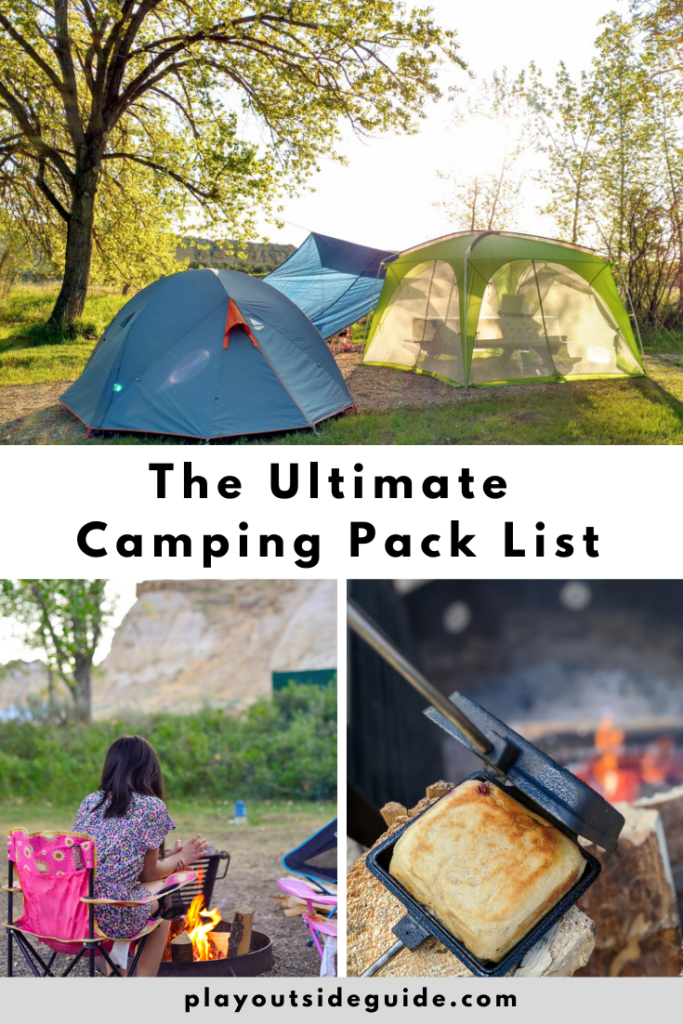
Related Posts
- Camping Sleep Systems: sleeping bags, sleeping pads, travel cribs
- How to Choose a Tent
- Epic Road Trip Planning Part 1: Vehicle Check
- Epic Road Trip Planning Part 2: Budgeting Tools & Tips
- Epic Road Trip Planning Part 3: Embrace the Journey
- Epic Road Trip Planning Part 4: Deciding Where to Stay
- Walk-In Campgrounds Near Calgary



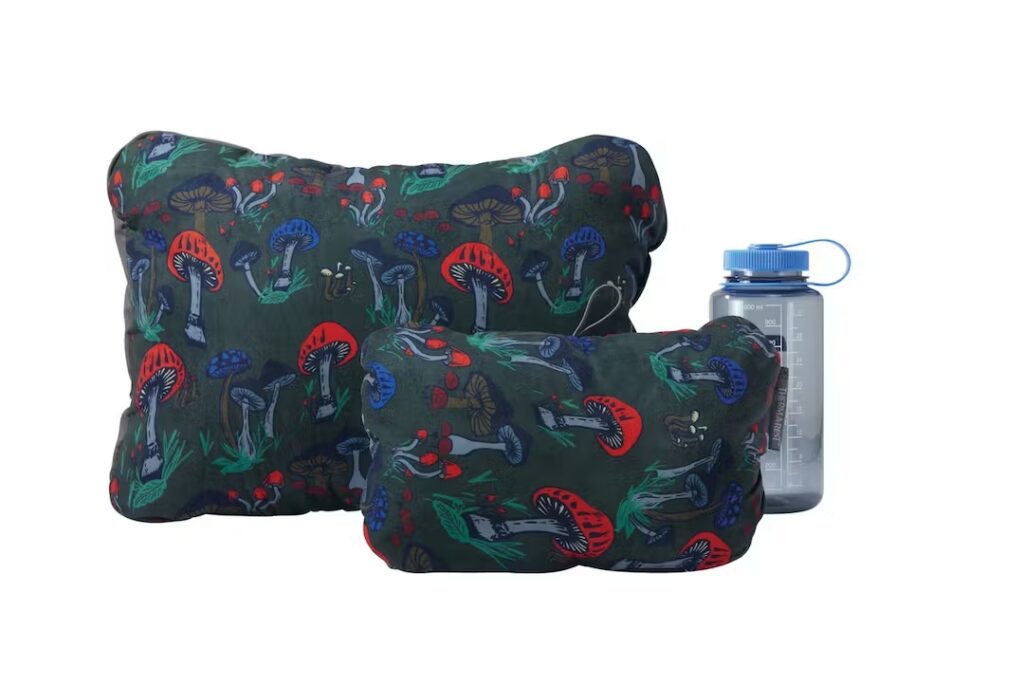
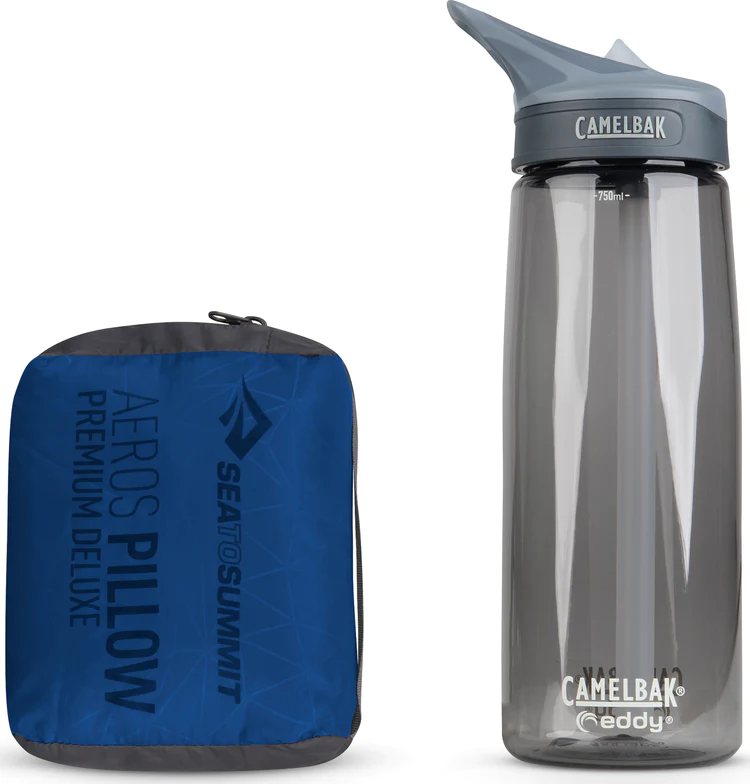
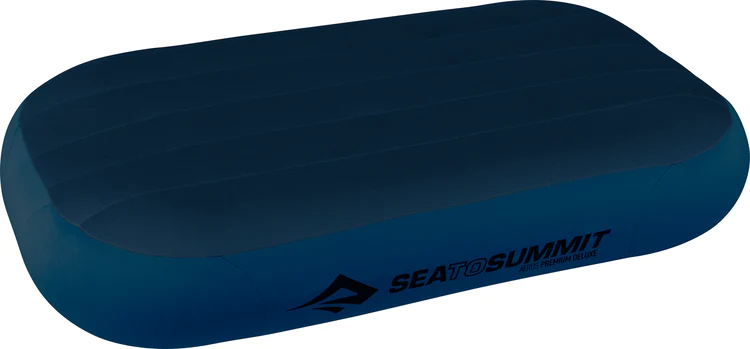

9 comments
Other necessities: Bailey's ?? Great list! We're packing for our first trip this weekend. Because we have not camped much with the boys, I forget the little things. But not my Bailey's ?
YES!! Bailey’s is a must!!! ♥ the stuff!
Automotive Buddy, there are definitely benefits of having a newer vehicle, but it's always good to check everything yourself before you head out. 🙂
Thanks Gary! Be sure to check out the rest of my Epic Road Trips articles!
Great advice! Thanks for adding to thediscussion.Thanks for putting this together! It looks very cool so far. I’ll be checking back to see the full plans.
Thanks Zohra! 🙂
Nice and very helpful information i have got from your post. Even your whole blog is full of interesting information which is the great sign of a great blogger.
I have a feeling "Charles" was a robot!
Nice write-up, Gal. Will save it and read other posts too.
Charles – you are a beauty! "Everybody does not know which air compressor is best" – I wonder if this is a Chineglish, or plain dumb, or a robot.
Comments are closed.